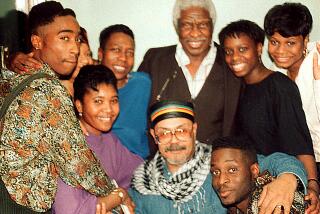‘Encyclopedia of American Left’ Offers a Radical ‘Family History’
- Share via
“A” is for American Indian Movement, Anarcho-Syndicalism, Anti-fascism, Atheism and Attica, among other topics. “B” is for Edward Bellamy, Black Panther Party, Bohemian Americans and Harry Bridges.
“C,” above all else, is for Communist Party U.S.A.
These are entries in the new “Encyclopedia of the American Left,” an exhaustive, 928-page reference work that offers a sympathetic look at the radical side of American history.
It is a “family history of the left,” says co-editor Paul Buhle, a history professor at the Rhode Island School of Design and a member of the Democratic Socialists of America. Buhle compiled the encyclopedia along with two co-editors and more than 300 contributors from around the nation.
They have presented a family history that attempts to include every significant member of a decidedly eccentric family. Buhle, whose academic roots are in the “people’s history” movement of the 1960s, has made sure the encyclopedia stresses cultural trends and gives full voice to women and minorities.
Thus, one of the longest entries in the book is under Modern Dance. Detective Fiction (which, we learn, is “the primary genre where political themes survive as the subtext of modern alienation”) also gets generous treatment.
There are lengthy entries for the Gay-Lesbian Liberation Movement, Women’s Liberation and the Civil Rights Movement. And this may be the only encyclopedia to include entries for Cape Verdean Americans (“the only major community of Afro-Americans to have voluntarily made the transatlantic voyage to this country”), and the Finnish-American songwriter T-Bone Slim (“Little is known of his life”).
The book, published by Garland Publishing Inc. of New York, is intended primarily for libraries. That’s just as well; at $95, they may be the only ones who can afford it. In a review last month, the Library Journal called it “unique and comprehensive” and “indispensable.”
Buhle said the encyclopedia relies heavily on the research done by ‘60s radicals who have moved into the ranks of academia in the past 20 years; much of it, he said, could not have been published before.
“We’re at the moment when these things are being uncovered for the first time,” he said, “and the encyclopedia is taking advantage of that.”
More to Read
Sign up for our Book Club newsletter
Get the latest news, events and more from the Los Angeles Times Book Club, and help us get L.A. reading and talking.
You may occasionally receive promotional content from the Los Angeles Times.








